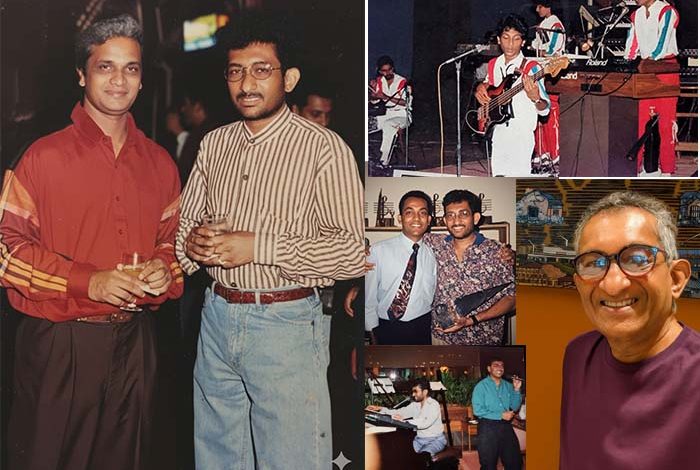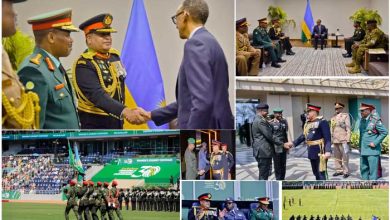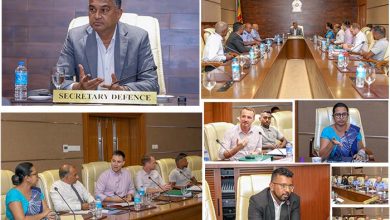Music as a Gateway to Sri Lanka: A Cultural Dialogue with Diliup Gabadamudalige

CeylonDigest is pleased to present an exclusive dialogue with Diliup Gabadamudalige, one of Sri Lanka’s most accomplished conductors, composers, and cultural promoters. His work reflects a rare combination of artistic mastery and a deep understanding of the country’s musical heritage, making him a central figure in bridging traditional and contemporary expressions of Sri Lankan music.
From a young age, his journey was shaped by a nurturing family environment, early exposure to diverse musical forms, and the guidance of mentors who recognised and encouraged his gifts. These formative experiences not only led him towards a professional career in music but also instilled a lifelong dedication to fostering cultural appreciation and artistic excellence.
In this conversation, CeylonDigest explores the lesser-known aspects of his musical journey: the role of schools and early music programmes in nurturing his talent, the influence of family support, and the pivotal moments that guided him into conducting, composition, and music production. Beyond technical mastery, he shares insights on how orchestral and traditional music can enrich tourism, stimulate local economies, and strengthen Sri Lanka’s global cultural identity.
This dialogue also uncovers his perspective on music as a source of personal reflection, meditation, and emotional well-being. It is a rare opportunity to learn how one artist balances tradition and innovation, while inspiring communities and generations through his creative vision.
CeylonDigest invites readers to immerse themselves in this in-depth conversation, discovering the personal experiences, professional insights, and cultural contributions of an individual whose music continues to resonate far beyond the concert hall—reaching audiences both in Sri Lanka and across the world.
Interview
CeylonDigest: Could you share a glimpse of your early childhood and the environment you grew up in?
Diliup Gabadamudalige:
I am an only child, but my parents didn’t spoil me. My father was instrumental in shaping my musical career. When he discovered that I was musical as a baby—I used to get emotional hearing certain songs—he bought me musical instruments. I was playing the ukulele before I was five years old and hammering on toy pianos, the sound of which still reverberates in my head after all these years. He bought me records as he had a gramophone, the old type with the big horn, and later a Phillips record player.
CeylonDigest: How did your parents influence your early interest in music?
Diliup Gabadamudalige:
My father had a knack for picking up any instrument and playing it after a short while. He listened to classical music and Latin American music, and he was a good ballroom dancer. So, I heard a lot of western dance music—samba, rumba, jive, cha-cha, twist, rock and roll. My mother listened to Sri Lankan songs and western pop music. So, I had a rich background in different types of music from a very early age.
CeylonDigest: Were there key individuals or moments during childhood that sparked your love for music?
Diliup Gabadamudalige:
Other than my father, who was a big influence, I was a natural where music was concerned. I felt music, the way you feel a breeze, a gust of hot wind, hear a thunderstorm, or the soothing sound of the sea or birds in our garden.
CeylonDigest: How did your school years contribute to your musical identity?
Diliup Gabadamudalige:
I studied at Royal College, where many friends helped shape my musical path. One name I always mention is my classmate Jehan Rajapakse, who introduced me to Kumar Navaratnam, a pioneer in Sri Lankan rock music. Another unforgettable name is Damayantha Kuruppu, who asked me to join a band he formed—I named it Lonesome Stone! I don’t know how that name came up!
CeylonDigest: Were you involved in school bands, choirs, or cultural activities that guided your path?
Diliup Gabadamudalige:
I was in the All-Schools Choir during the Siyawas Education Centenary celebrations. At Royal Junior, I took part in many theatre productions. At Royal College, I was a pioneer member of the Royal College Western Band, initiated by Mrs. Welikala in the early 70s. Later, I organised the first musical concert for Royal College called Drosophila (the zoological name of the fruit fly) and later orchestrated and recorded the Royal College Song in my studio with the College Choir, which they still use. I also composed a song for the Royal College Millennium Walk.
CeylonDigest: Did any teachers or mentors play a significant role during your early development?
Diliup Gabadamudalige:
My piano teacher was Mrs. Manel Weerasinghe, and Mrs. Eileen Prins taught me the violin. The technique I learned from them helped me immensely. Later on, Dr. Earl De Fonseka guided me on special finger techniques and hand control. Ajith Dahanayake helped me learn great instrumental music, and Kumar Navaratnam opened a new path by introducing me to rock music. Ravi Balasuriya constantly encouraged me to write English songs.
CeylonDigest: When did you first realise that music would become your professional career?
Diliup Gabadamudalige:
In 1983, when I quit Air Lanka to take up music full time. I joined the Ramada Renaissance Hotel as their resident pianist, and the F&B Director told me he was impressed and that I should pursue music professionally.
CeylonDigest: What early challenges did you face?
Diliup Gabadamudalige:
My biggest challenge was convincing my father, who did not want me to be a full-time musician. It took a while for him to realise that music could be a serious career—and that I was doing well.
CeylonDigest: How did you progress into conducting and music production?
Diliup Gabadamudalige:
I was always creative. In my youth in Jayanthipura, Battaramulla, I wrote, directed and produced a play titled Do Not Go Astray, My Son (නොමග නොයන් පුතේ), along with a song by the same name. I composed music from my early teens. My breakthrough came when I directed music for Miss Sri Lanka 1996 and later when veteran designer Senaka De Silva invited me to compose music for the ICOMOS conference show in 1999, where I worked with Channa Wijewardane. That’s when I realised I was a natural fusion composer.
I wrote the Sinhala song Love Song (ආදරේ ගීතය) for Samitha Mudunkotuwa, another song for Corrine Almeida, and I composed music for a song with lyrics by the late Clarence Wijewardene, which The Gypsies performed. I did musical backing and arrangements for several Gypsies albums—the Gypsies Gold album was entirely done by me on keyboard sequencing.
CeylonDigest: What inspires your creative direction?
Diliup Gabadamudalige:
That’s a hard question. Inspiration comes from various sources depending on the task at hand.
CeylonDigest: What makes orchestral performance meaningful to you?
Diliup Gabadamudalige:
My orchestral performances were mostly during my youth. I joined the Junior Symphony Orchestra of Sri Lanka, and after about a year I was asked to lead it. I left after two years to form a rock band.
CeylonDigest: How does Sri Lanka’s cultural identity influence your music?
Diliup Gabadamudalige:
My debut in fusion music began with the ICOMOS pageant in 1999. Since then, I have released several albums, now available on Spotify.
CeylonDigest: How do you balance traditional foundations with modern expression?
Diliup Gabadamudalige:
Fusion goes deeper than simply mixing Sri Lankan and Western instruments. The musical ideas of both cultures must blend. I believe I achieved that in my albums.
CeylonDigest: How has your work represented Sri Lanka internationally?
Diliup Gabadamudalige:
My music reached international audiences mostly through Channa Wijewardane’s dance troupe. They performed with me at the venues where I played, using my original compositions. The rest is history.
CeylonDigest: How important has family support been to your career?
Diliup Gabadamudalige:
Without family support, I wouldn’t have been able to do what I did.
CeylonDigest: How do you balance creativity and personal life?
Diliup Gabadamudalige:
They blended perfectly. My family supported my work, so there were never any conflicts.
CeylonDigest: Which achievements are most significant to you?
Diliup Gabadamudalige:
I came first in South East Asia for Piano Performance at Trinity College, London, in the late 1960s. I received the Kala Suri title and the Lylie Godrich Memorial Award. I also won two Presidential Awards—for Best Film Music (Raajya Sevaya Pinisai) and Best Song (Sanda Thaniyama, sung by Nirosha Virajini).
CeylonDigest: A memorable concert or collaboration?
Diliup Gabadamudalige:
My performance at the Made for Each Other show in India with Dalrene.
My concert for HelpAge Sri Lanka at Taj North Lawn.
My long-term collaboration with Channa Wijewardane, composing exclusive music for him.
CeylonDigest: Important collaborations?
Diliup Gabadamudalige:
In the late 1970s, I collaborated with Ravi Balasuriya, Aruna Siriwardane and Benjy Ranabahu to form Mary, the first Sri Lankan rock band to play all original music—my compositions. These songs were aired on SLBC for decades.
I composed music for Sri Lanka’s 50th Independence Celebration, and in 2006 wrote lyrics and music for both an English and a Divehi album for a Maldivian artist.
CeylonDigest: How do you see orchestral music evolving in Sri Lanka?
Diliup Gabadamudalige:
Oriental orchestras mostly back pop singers, and western orchestras keep playing the same old pieces. Sri Lankan composers need to write more original orchestral music.
CeylonDigest: How can music support tourism?
Diliup Gabadamudalige:
Music plays a serious role in people’s lives. The right music keeps audiences longer; the wrong music drives them away. The late Mr. Lakshman Kadirgamar always invited me to perform because I knew the right music for each occasion. Artists must build rapport with audiences—loudness and costumes alone won’t do it.
CeylonDigest: Can the arts contribute to economic growth?
Diliup Gabadamudalige:
Definitely. The state should promote all forms of Sri Lankan music. But artists must avoid low-quality music and crude lyrics. Music contributes to cultural growth.
CeylonDigest: Your vision for the future of Sri Lankan music?
Diliup Gabadamudalige:
With today’s technology, our music can reach the entire world. Many of our artists can stand on the same stage as international musicians.
CeylonDigest: How can young musicians merge tradition and modernity?
Diliup Gabadamudalige:
One of my students, Chanuka Mora of Yaka Crew, does this very well. Bathiya, another student of mine, blended pop, rap, and fusion beautifully.
CeylonDigest: Is music a form of meditation or healing?
Diliup Gabadamudalige:
Certain types of music can calm the mind and help with healing, especially low frequencies that align with brainwave patterns. But this doesn’t work for everyone.
CeylonDigest: How do you personally find grounding through music?
Diliup Gabadamudalige:
I use the Buddha Dhamma to cleanse my mind. Music helps me feel good, but that is temporary.
CeylonDigest: What message would you share with listeners seeking healing?
Diliup Gabadamudalige:
Peace and healing should not be temporary. They come only through cleansing the mind—and for that, I can recommend nothing other than the Buddha Dhamma.
CeylonDigest: What advice would you offer emerging musicians?
Diliup Gabadamudalige:
Listen to music—all types. Learn from anyone. Practice daily. Play from the heart. Make people listen, not just dance. Instrumental music is dying worldwide; revive it. Instrumental music inspires imagination—lyrics often leave nothing to imagine.
CeylonDigest: How would you like your contributions to be remembered?
Diliup Gabadamudalige:
I taught free for over a year at the Aesthetic University. I shared my knowledge freely on Rupavahini and in newspapers in the 1990s. I have shaped the future of many popular artists. Even if no one remembers me, I know I shared my knowledge—and it lit someone’s future. That is enough.
This dialogue offers a comprehensive view of Diliup Gabadamudalige’s life and contributions. Through dedication, creativity, and deep respect for tradition, his work continues to strengthen Sri Lanka’s musical heritage while embracing global perspectives. CeylonDigest is proud to present this conversation, highlighting an artist whose skill, commitment, and vision ensure that Sri Lankan music will continue to inspire audiences for generations.






